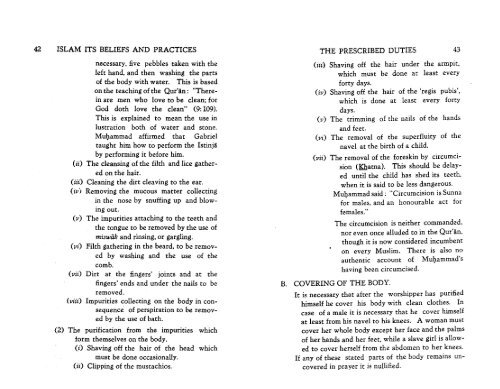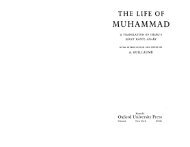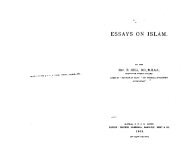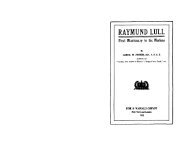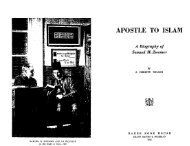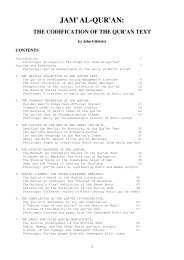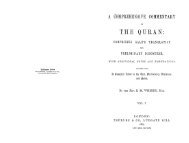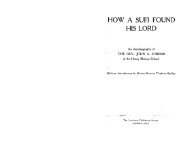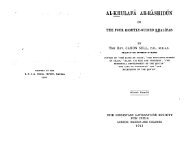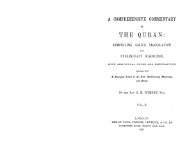Islam Its Belief and Practices - Radical Truth
Islam Its Belief and Practices - Radical Truth
Islam Its Belief and Practices - Radical Truth
Create successful ePaper yourself
Turn your PDF publications into a flip-book with our unique Google optimized e-Paper software.
42 ISLAM ITS BELIEFS AND PRACTICES THE PRESCRIBED DUTIES 43<br />
necessary, five pebbles taken with the<br />
left h<strong>and</strong>, <strong>and</strong> then washing the parts<br />
of the body with water. This is based<br />
on the teaching of the Qur'an: "Therein<br />
are men who love to be clean; for<br />
God doth love the clean" (9: 109).<br />
This is explained to mean the use in<br />
lustration both of water <strong>and</strong> stone.<br />
Mul;1ammad affirmed that Gabriel<br />
taught him how to perform the Istinja<br />
by performing it before him.<br />
(ii) The cleansing of the filth <strong>and</strong> lice gathered<br />
on the hair.<br />
(iii) Cleaning the dirt cleaving to the ear.<br />
(iv) Removing the mucous matter collecting<br />
in the nose by snuffing up <strong>and</strong> blowing<br />
out.<br />
(v) The impurities attaching to the teeth <strong>and</strong><br />
the tongue to be removed by the use of<br />
miswiik <strong>and</strong> rinsing, or gargling.<br />
(vi) Filth gathering in the beard, to be removed<br />
by washing <strong>and</strong> the use of the<br />
comb.<br />
(vii) Dirt at the fingers' joints <strong>and</strong> at the<br />
fingers' ends <strong>and</strong> under the nails to be<br />
removed.<br />
(viii) Impurities collecting on the body in consequence<br />
of perspiration to be removed<br />
by the use of bath.<br />
(2) The purification from the impurities which<br />
form themselves on the body.<br />
(i) Shaving off the hair of the head which<br />
must be done occasionally.<br />
(ii) Clipping of the mustachios.<br />
(iii) Shaving off the hair under the armpit,<br />
which must be done at least every<br />
forty days.<br />
(iv) Shaving off the hair of the 'regis pubis',<br />
which is done at least every forty<br />
days.<br />
(v) The trimming of the nails of the h<strong>and</strong>s<br />
<strong>and</strong> feet.<br />
(vi) The removal of the superfluity of the<br />
navel at the birth of a child.<br />
(vii) The removal of the foreskin by circumcision<br />
(Kl!atna). This should be delayed<br />
until the child has shed its teeth.<br />
when it is said to be less dangerous.<br />
Mul;1ammad said: "Circumcision is Sunna<br />
for males, <strong>and</strong> an honourable act for<br />
females."<br />
The circumcision is neither comm<strong>and</strong>ed,<br />
nor even once alluded to in the Qur'an,<br />
though it is now considered incumbent<br />
on every Muslim. There is also no<br />
authentic account of Mul;1ammad's<br />
having been circumcised.<br />
B. COVERING OF THE BODY.<br />
It is necessary that after the worshipper has purified<br />
himself he cover his body with clean clothes. In<br />
case of a male it is necessary that he cover himself<br />
at least from his navel to his knees. A woman must<br />
cover her whole body except her face <strong>and</strong> the palms<br />
of her h<strong>and</strong>s <strong>and</strong> her feet, while a slave girl is allowed<br />
to cover herself from the abdomen to her knees.<br />
If any of these stated parts of the body remains uncovered<br />
in prayer it is nullified.


